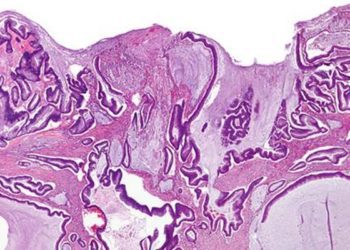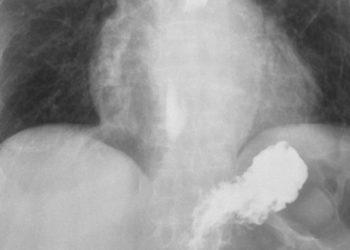Intravenous omeprazole after endoscopy reduces rebleeding in patients with peptic ulcers [Classics Series]
Image: CC/L. academia
1. After endoscopic treatment, intravenous omeprazole significantly reduces the risk of rebleeding in patients with peptic ulcers at 3, 7, and 30 days
Original Date of Publication: August 3, 2000
Study Rundown: The findings of this trial demonstrate the value of a proton pump inhibitor in reducing the risk of rebleeding in patients with peptic ulcers. The fact that this study was carried out at a single centre in a predominantly Chinese population may limit the generalizability of the study. Moreover, the use of intravenous omeprazole is another concern, as it may not be available in certain other practice settings. Other studies, however, have demonstrated similar benefits with using orally administered proton pump inhibitors.
In sum, intravenous omeprazole reduces the risk of rebleeding in patients with bleeding peptic ulcers after endoscopic treatment.
In-Depth [randomized controlled study]: This trial, published in 2000 in NEJM, sought to explore the value of intravenous omeprazole after endoscopy to reduce the risk of rebleeding in patients with peptic ulcers. After endoscopic treatment, bleeding peptic ulcers have been shown to rebleed in 15-20 percent of patients, though acid suppression may help stabilize clots and reduce the bleeding risk.
The trial was conducted at the Chinese University of Hong Kong. A total of 240 patients were randomized to receive either intravenous omeprazole (i.e., 80 mg bolus, then 8 mg/hour for 72 hours) or placebo after endoscopic treatment for bleeding peptic ulcers. Treatment with omeprazole significantly reduced the risk of recurrent bleeding at days 3, 7, and 30 compared to placebo. Moreover, omeprazole significantly reduced the length of hospitalization and blood transfusion requirements, though there were no significant differences in mortality between the two groups.
By Adrienne Cheung, Andrew Cheung, M.D.
© 2013 2minutemedicine.com. All rights reserved. No works may be reproduced without written consent from 2minutemedicine.com. Disclaimer: We present factual information directly from peer reviewed medical journals. No post should be construed as medical advice and is not intended as such by the authors or by 2minutemedicine.com. PLEASE SEE A HEALTHCARE PROVIDER IN YOUR AREA IF YOU SEEK MEDICAL ADVICE OF ANY SORT. Content is produced in accordance with fair use copyrights solely and strictly for the purpose of teaching, news and criticism. No benefit, monetary or otherwise, is realized by any participants or the owner of this domain.




![The ABCD2 score: Risk of stroke after Transient Ischemic Attack (TIA) [Classics Series]](https://www.2minutemedicine.com/wp-content/uploads/2013/05/web-cover-classics-with-logo-medicine-BW-small-jpg-350x250.jpg)